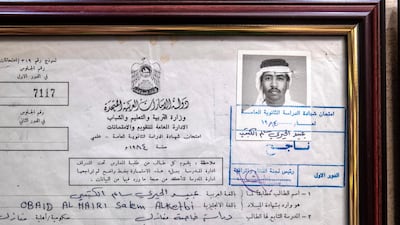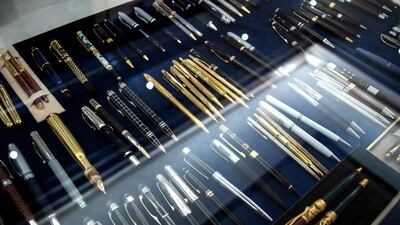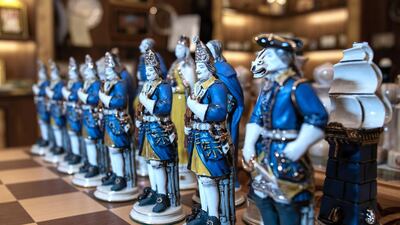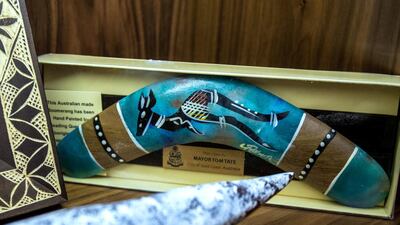In the personal museum of Maj Gen Obaid Al Ketbi, each corner tells a story.
The life of the former ambassador and army and police general has been rich in experiences, from serving in Kosovo and Iraq to becoming the chairman of Abu Dhabi Grand Prix.
What many people don’t know is that he also keeps a collection of precious personal belongings.
His home-grown gallery houses more than 15,000 items and occupies two storeys of his Abu Dhabi villa.
The National was invited on an exclusive tour.
The artefacts include swords and rifles, a field phone from the Second World War and the first model of car-phone, used in the 1970s.
“What is really interesting is that when I have people visit here, especially from outside the UAE, they look at the things from different parts of the world, and if they don’t find something from their country, they come back with a gift,” Maj Gen Al Ketbi said.
“For me, this is an open space where people can visit to see something from our culture.”

Next to an exotic Tajik crescent-shaped weapon whose handle has been crafted in the shape of a snake's head lies an original samurai sword as well as one of 15 original swords used in The Lord of the Rings film trilogy.
“Every item you see here has a story behind it,” he said.
While many treasures found at the museum were gifts, he entered lengthy negotiations to acquire the film prop.
The sword was the last remaining piece of the 15 that were used on set; the first three are owned by Britain’s Queen Elizabeth, the Japanese Emperor and former US President Barack Obama, respectively.
“I fought for the last remaining one. It was on display and not for sale,” he said.
Maj Gen Al Ketbi came across the sword at a gallery in Queenstown, New Zealand, while touring the region in which the film was shot.

“They did not want to sell it. We had to go through many negotiations and I had to convince them why I wanted to buy it,” he said.
“I told them I was impressed by the film itself and the story. I also explained how I love historical and antique pieces and that I would to have it as part of my collection back home.”
That he was the UAE ambassador to Australia at the time could have been a deal-breaker, but the Emirati used his powers of persuasion.
“I said: ‘Imagine if I take this back with me all the way from here to the UAE and I tell your story to anyone who visits me?’.”
The supervisor was eventually convinced and sold him the sword for an undisclosed sum.
“I believe it will be worth millions one day,” he said.
In the centre of the first room lie two remarkable chessboards.
The first was given to him by a Russian businessman. Its pieces have been crafted down to the smallest detail to represent replicas of a Russian and Swedish army that once faced each other in battle.

“It was custom-made. The beauty of it is that each piece has its own unique details,” he said.
Next to it is a chessboard with more traditional pieces, yet are all made of marble.
Another space features gifts from diplomats and political figures.
“The most interesting part is the exchange of gifts,” Maj Gen Al Ketbi said.
He pulled out a historical Japanese scroll and a notebook.
“This was a gift from the Japanese ambassador. It describes a battle that happened in the past.
“If you can read Japanese you will understand the story,” he said.
While significantly valuable pieces of art can be spotted in every corner, some collectibles are valuable to their owner simply because of the story they tell.
Maj Gen Al Ketbi has kept every personal belonging he had since he joined the UAE Armed Forces in 1976. Some items are older and were acquired by his parents.

He pointed to a framed document on the wall.
“This is my elementary school certificate as issued and framed in 1971,” he said.
“I have my old credit cards, mileage cards, ID cards, drivers’ licences, watches, pens, passports and mobile phones; I never throw anything away.”
His first mobile car-phone, obtained in 1978, was also on display.
“You had to get permission to use this phone in your car,” he said.
The device looked nothing like the handheld gadgets used today. It resembled a medium-sized briefcase.
“The number was 31320. It used to be five digits.”

In the third room, Maj Gen Al Ketbi keeps sporting prizes and memorabilia, including medals, T-shirts, photos and caps.
They are linked to Al Forsan, his initiative to promote Emirati involvement in sport.
“I formed Al Forsan in 2008 to encourage people to become healthier and exercise more,” he said.
The major general launched the project after adopting a more active lifestyle upon his return from a war zone.
He was part of the UAE mission that joined Nato’s Kfor peacekeepers on the Albanian border in 1999, to which thousands of Kosovan refugees had fled.
“In 1999, after I returned from Kosovo, I gained weight until I reached 107 kilograms,” he said.
A year later, he gradually adopted a healthier lifestyle. By 2008 he had shed more than 20kg and become a sports enthusiast.
At the centre of the room hangs “the largest medal in the world” as recognised by Guinness World Records.
The stories to be told about the items in the museum are countless, said Maj Gen Al Ketbi, and there is still more to come.
“I am trying to find more space, because I think I have more items to display,” he said.
“I really feel proud because everything I have received in life you will find it here.”















